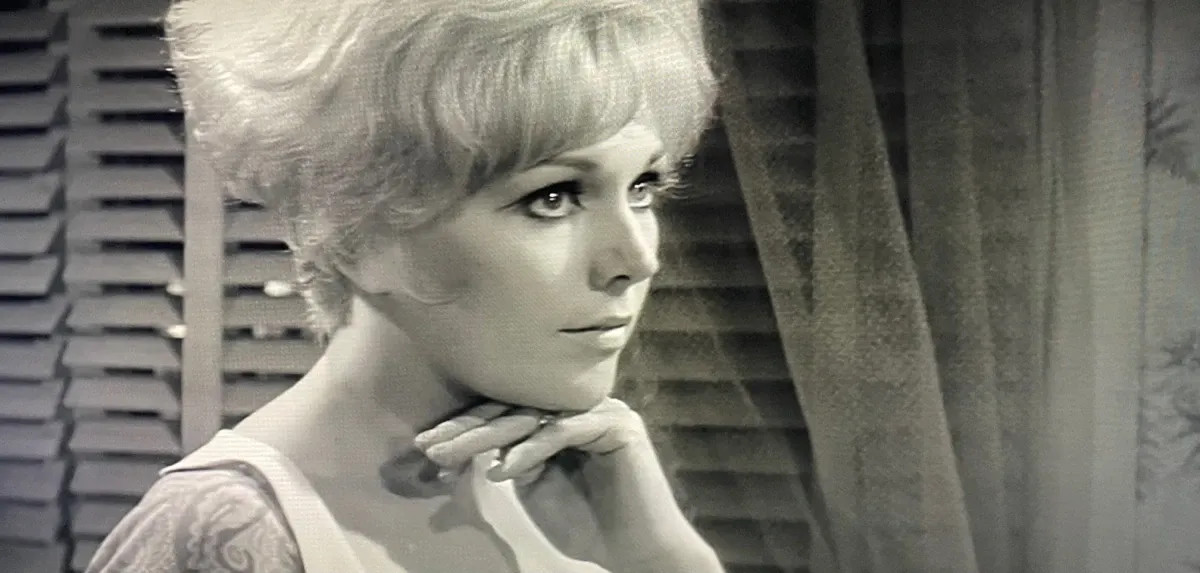KIM

When prostitute Polly the Pistol (Kim Novak) makes her exit from the Venetian-blind–shuttered town of Climax, Nevada, in Billy Wilder's Kiss Me, Stupid (1964), she leaves with her parrot and a travel trailer, managing to emancipate herself from the confines of a town as dry—socially and culturally—as the desert surrounding it.
It never occurred to me until this week, while reading a couple of past interviews from 2021 with Novak (now 92 years old), how the film’s ending could be seen as a symbolic parallel to the actress’s own departure and early 'retirement' from Hollywood in the mid-to-late ’60s—a place where many believe you prostitute your soul in the pursuit of making it big.
“Hollywood swallowed people whole,” Novak said in an interview with Fox Digital back in 2021.
Speaking about Marilyn Monroe’s untimely death at the age of 36, Novak went on to say: “I didn’t want that to happen to me.”
Coincidentally, Monroe’s last film production, Something’s Got to Give (1962), also starred Dean Martin, who essentially plays himself (“Dino”) in the Rat Pack–themed Kiss Me, Stupid two years later, with Novak in a role Wilder might easily have written for Monroe had she lived. Polly the Pistol is a more world-weary, cynical version of Sugar Kane in the Austrian director’s iconic comedy Some Like It Hot (1958), which epitomised Monroe’s “ditzy blonde” stereotype at the peak of her fame.
Perhaps Novak, not wanting to be remade in Monroe’s shadow after her death, sensed it was time to leave Tinseltown and find peace away from the spotlight. The idea of being “made over” haunted much of her screen career. Nowhere is this more evident than in Hitchcock’s Vertigo, where her character Judy Barton is transformed into the image of Madeleine Elster (herself a ghostly stand-in for Carlotta Valdes), whom detective John “Scottie” Ferguson (James Stewart) obsessively attempts to reconstruct. Hitchcock himself would also later try to recreate Grace Kelly through Tippi Hedren’s performances in The Birds and Marnie—an unsettling echo of Scottie’s pathology.
That same theme resurfaces in Wilder’s Kiss Me, Stupid. As Polly the Pistol, Novak is once again asked to inhabit an identity not her own—the wife of music teacher Orville Spooner (Ray Walston). Yet unlike in Vertigo, where the transformation destroys her character, Polly seizes the role as a stepping stone toward something greater. By glimpsing the possibility of belonging to a more meaningful life, she clarifies her desire to leave town—mirroring Novak’s own decision to step away from Hollywood before it could remake her again.
Asked how she felt about leaving Hollywood at that time, Novak said: “Liberated. Totally liberated. I thought, ‘Wow, I’m going to live my dream and not for someone else.’ It was wonderful. My cat was purring, the birds were singing, the waves were crashing—we were all just content. The first thing I did when I woke up was to get all my art equipment, set up my easel, and look out the window. I thought to myself, ‘This is paradise.’ Hollywood offers money and prestige, but nothing ever compares to that feeling I felt that morning.”
In another 2021 interview, this time with The Guardian, she further expounded on the Faustian pact of Hollywood and the celebrity lifestyle. Speaking about Frank Sinatra (whom she was rumoured to have dated privately, as well as her more controversial affair with Sammy Davis Jr.), she pinpointed the dilemma for people like herself and Sinatra—caught between their true selves and their celebrity personas.
“The real Sinatra was a very sensitive person. But he was affected by people putting him on a pedestal, so he let that simple, beautiful side of him go. You can get lured into loving yourself too much. That’s why I left Hollywood. I didn’t want to get into all of that. I didn’t want to lose myself. I needed to leave to save myself. I like who I am, even with the suffering you go through, even with the fact that when you’re vulnerable you feel everything so intensely.”
Did she really think she might lose herself? “Absolutely. It’s exciting to dress up in gorgeous clothes and to feel sexy and to look sexy. It’s wonderful, but it’s a trap. You become satisfied with that being enough, then later in life it isn’t enough. So many people, once they got older and were no longer looked at for their beauty, just fell apart.”
From a personal creative viewpoint, I often thought of Novak when writing the character of Eva Hayward in my TV pilot Cal-Neva—a screen actress trying to escape the attention of powerful men (entertainers, gangsters, politicians) and, like Monroe, meeting a premature tragic death. In shaping Eva, I drew on Monroe’s playfulness but also on Novak’s enigmatic quality, finding myself, much like “Scottie” in Vertigo, guilty of recreating them in my imagination—compelled by the very qualities that cost one her life and pushed the other into early retirement.
It was pleasing, then, to see Novak honoured with a lifetime achievement award earlier this week at the Venice Film Festival—a moment that once again reaffirmed her decision to walk away from Hollywood was not only courageous but profoundly wise.
Some things ask too high a price for what they’re truly worth—such as peace of mind.